Theater Review: All My Sons, “Timeless and Timely”
September 20, 2019 Laura Foti Cohen
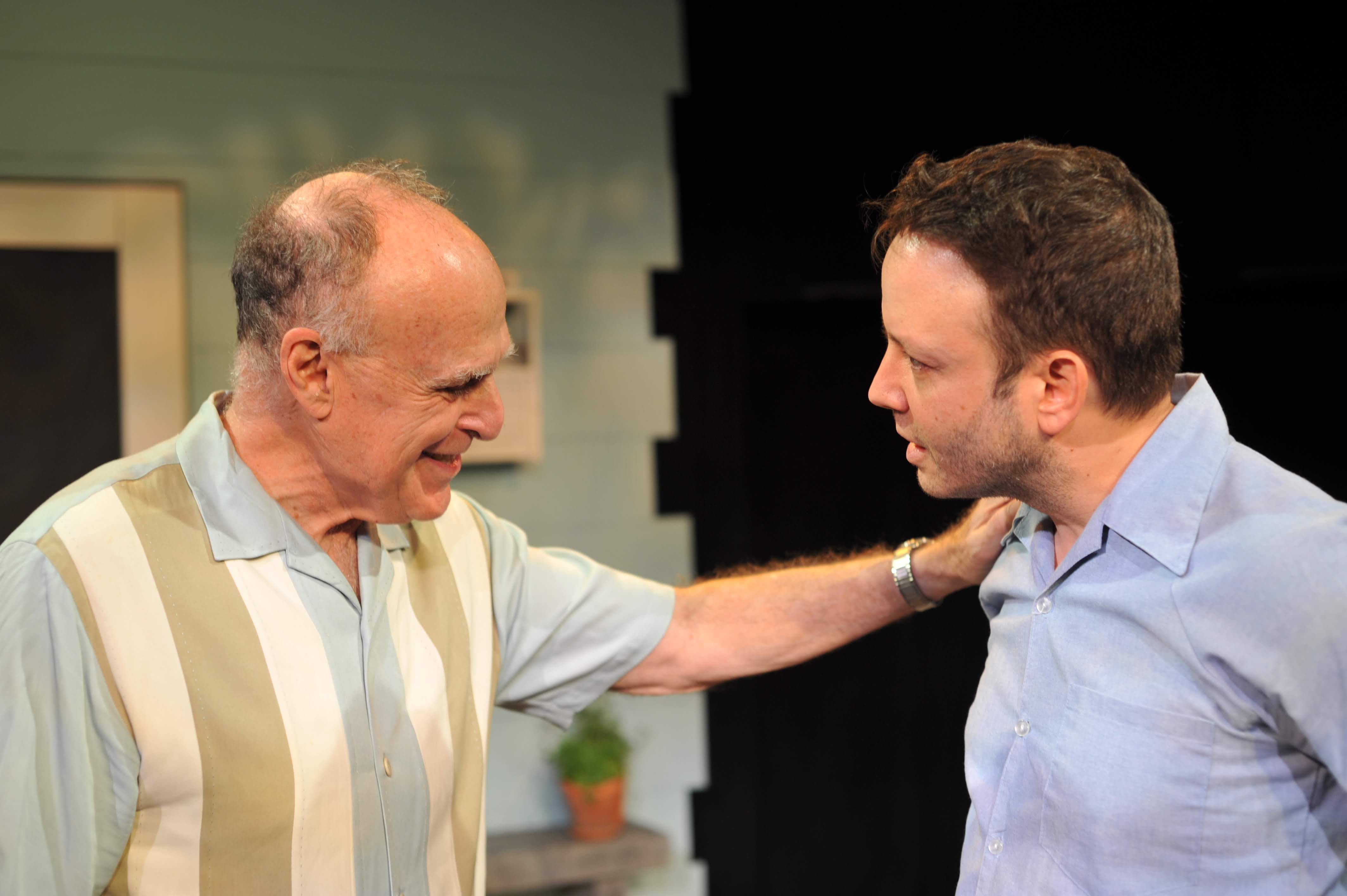 A father (Richard Fancy) pleads pleads with his son in Arthur Miller’s All My Sons.
A father (Richard Fancy) pleads pleads with his son in Arthur Miller’s All My Sons.
What becomes a legend most? We all have cherished memories of plays that reframed our view of the world, entertained us in a new way or just plain wowed us. Plays we thought were the most brilliant, the funniest, the most insightful. Years later, when we see those plays again, it can be a let-down when they don’t move us in the same way. Often, they feel trite or maudlin, too obvious or manipulative.
And then there are the true classics, able to amaze, amuse or inspire after the passage of years. Able to attract new acolytes when restaged decades later.
Arthur Miller’s All My Sons is such a classic. The 1947 Tony award winner for “Best Author” (a now-defunct category) is given the treatment it deserves in its current production at Pacific Resident Theatre. If you’ve seen it before you’ll find new details, learn more about the human condition, draw fresh parallels to today. If you’re seeing it for the first time, it will stun you.
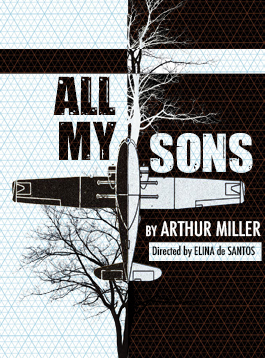 The plot is deceptively simple: Joe and Kate Keller have two sons, Chris and Larry, both of whom served in World War II. Chris came home, Larry is MIA. Chris has invited Larry’s girlfriend, Ann, who had moved away after his disappearance, to come for a visit.
The plot is deceptively simple: Joe and Kate Keller have two sons, Chris and Larry, both of whom served in World War II. Chris came home, Larry is MIA. Chris has invited Larry’s girlfriend, Ann, who had moved away after his disappearance, to come for a visit.
Joe (Richard Fancy) has mixed feelings about the impending visit; Kate (Terry Davis) sees it as a betrayal. She is convinced her missing son is still alive: “There’s God, so certain things can never happen.” Oh, Mother. If only.
Chris (Marc Valera) reveals his feelings to Ann (Amy-Helene Carlson) against his mother’s exhortations, setting up a family schism and the revelation of secrets and lies.
Layers build, as a straightforward Middle America set piece reveals itself as a mystery, a satire, a commentary, a moral fable and a documentary about mid-20th century society with tragic relevance to our 21st-century reality. All My Sons is the proverbial frog in a pot of water, patiently raising the temperature toward the inevitable yet surprising meltdown.
This production, sensitively directed by Elina de Santos, finds every nuance of Miller’s brilliant script. De Santos accurately described the play as “”timeless and timely” when she introduced the performance.
Spot-on scenic design by Dillon G. Artzer makes remarkable use of a small stage. As the clear-eyed father trying to salvage normalcy for his family, Richard Fancy leads the cast with an awe-inspiring performance. Supporting players add context but it’s the family and Ann who are given the most to do and, here on Venice Boulevard, they deliver in spades.
All My Sons runs through Nov. 15 at Pacific Resident Theatre, 703 Venice Blvd. Shows are Thursday, Friday and Saturday at 8:00 pm, Sundays at 3:00 pm. There are Saturday matinees at 2:00 pm on Oct. 5, Oct. 19 and Nov. 16, as well as Sunday evening performance at 7:00 pm on Sept. 29. Tickets are $29. For more information and tickets, click here or call (310) 822-8392.
An Intriguing ANDY WARHOL’S TOMATO Captivates at the Pacific Resident Theatre. By Vince Melocchi/directed by Dana Jackson/
by Gil Kaan Aug. 12, 2019
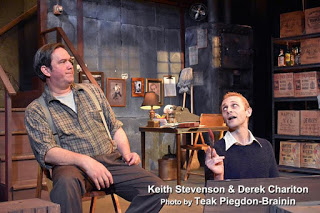 The world premiere of playwright Vince Melocchi’s Andy Warhol’S TOMATO receives a solid mounting at the Pacific Resident Theatre. Dana Jackson directs this fictionalized two-hander on the possible beginnings of pop artist icon Andy Warhol, with a deft hand and a meticulous eye for character development via the subtle physical actions of the two wonderfully convincing actors – Derek Chariton as Andy Warhol and Keith Stevenson as Bones BWW Review: An Intriguing ANDY WARHOL’S TOMATO Captivates at the Pacific Resident Theatre. Bonino, the owner of the bar’s storage room which TOMATO entirely takes place in. Chariton vividly captures the unique idiosyncrasies of Warhol while giving inner life to lines Warhol might have really said. Stevenson effortlessly portrays Bones, some might describe as the polar opposite of Warhol, as a gruff on the outside, compassionate, caring drinking man’s man. Their initial cat-and-mouse dialogue so piques your interest questioning what exactly keeps their conversation going.
The world premiere of playwright Vince Melocchi’s Andy Warhol’S TOMATO receives a solid mounting at the Pacific Resident Theatre. Dana Jackson directs this fictionalized two-hander on the possible beginnings of pop artist icon Andy Warhol, with a deft hand and a meticulous eye for character development via the subtle physical actions of the two wonderfully convincing actors – Derek Chariton as Andy Warhol and Keith Stevenson as Bones BWW Review: An Intriguing ANDY WARHOL’S TOMATO Captivates at the Pacific Resident Theatre. Bonino, the owner of the bar’s storage room which TOMATO entirely takes place in. Chariton vividly captures the unique idiosyncrasies of Warhol while giving inner life to lines Warhol might have really said. Stevenson effortlessly portrays Bones, some might describe as the polar opposite of Warhol, as a gruff on the outside, compassionate, caring drinking man’s man. Their initial cat-and-mouse dialogue so piques your interest questioning what exactly keeps their conversation going.
BWW Review: An Intriguing ANDY WARHOL’S TOMATO Captivates at the Pacific Resident Theatre. Set in 1946, Hometead, PA, TOMATO opens with a semi-consc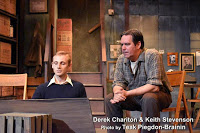 ious Andy waking up after being rescued prone off the street in front of Bonino’s by Bones. TOMATO presents an intimate, quiet look at the various encounters Andy and Bones have after Andy agrees to compensate for a picture frame of Bones he damaged, with the painting of Bonino’s new front door sign. Melocchi sprinkles enough known facts of Warhol’s life to make you wonder, really wonder, if you’re watching a non-fiction depiction rather than the well-constructed story Melocchi made up.
ious Andy waking up after being rescued prone off the street in front of Bonino’s by Bones. TOMATO presents an intimate, quiet look at the various encounters Andy and Bones have after Andy agrees to compensate for a picture frame of Bones he damaged, with the painting of Bonino’s new front door sign. Melocchi sprinkles enough known facts of Warhol’s life to make you wonder, really wonder, if you’re watching a non-fiction depiction rather than the well-constructed story Melocchi made up.
BWW Review: An Intriguing ANDY WARHOL’S TOMATO Captivates at the Pacific Resident Theatre. Kudos to scenic designer Rich Rose for his detailed Bonino’s storage room/office combo, Andrew Schmedake for his lighting and projection design clearly delineating the passage of night and day, and Christopher Moscatiello for his various sound effects of the unseen upstairs restaurant and the outside street traffic above.
At approximately 80 minutes in length, TOMATO’s just the perfect time to spend with two well-written, well-directed, well-acted characters that keep you transfixed by their quirky, but incredible relationship. Your heartstrings will be pulled.
www.pacificresidenttheatre.com
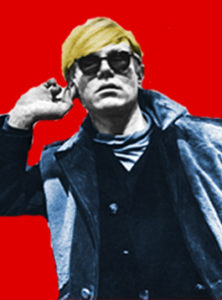 “CRITIC’S CHOICE” – LA Times “TOP TEN” – Stage Raw
“CRITIC’S CHOICE” – LA Times “TOP TEN” – Stage Raw
It’s 1946 in Pittsburgh. An 18-year-old Andy Warhol finds himself in the basement of the working class bar. Over the course of a summer, Andy gives and gets inspiration, guidance, and friendship from a surprising source.
A brand new season begins in August for L.A.’s multi-award winning Pacific Resident Theatre as they announce the world premiere staging of “Andy Warhol’s Tomato,” by Vince Melocchi. This marks the first play of the 2019/20 Season.
Written by Vince Melocchi (Ovation Award nom for “Original Play” – Lions) and directed by Dana Jackson (LADCC noms and AwardEccentricities of a Nightingale – LA Times Critic’s Choice, five Sage Awards, multiple Broadway World Nominations), this new work is being supported and developed by PRT as part of their commitment to providing opportunities for artists and craftsmen to enrich their skills.
Pittsburgh folklore has it that there is a working class bar which has the reputation for being the place where a teenage Andy Warhol drew on napkins in exchange for Coca-Cola. While drinking at that same bar, playwright, Vince Melocchi, began to see it in a different way… as a creative, mysterious place. He noted, “Andy allowed us to see, think, and feel about art in a completely new way. I wanted to find out who and what were his real influences. Andy Warhol’s Tomato imagines a chance encounter between Warhol and a Pittsburgh bar owner, as a step on his extraordinary journey.”
Directed by Dana Jackson, the cast includes Derek Chariton (as Andy Warhol) and Keith Stevenson (as Bones).
“Andy Warhol’s Tomato” runs Fridays and Saturday at 8pm, Sundays at 3pm, Thursdays Oct 17th and 24th at 8pm, through October 27, 2019.Pacific Resident Theatre is located at 703 Venice Blvd., in Venice, CA 90291. Tickets are $25 – $34 and can be purchased online at https://pacificresidenttheatre.org or by calling (310) 822-8392.800×800
Culture Watch – A Delicious “Tomato”
Sarah A. Spitz4 weeks agono commentAndy WarholAndy Warhol’s TomatoDerek CharitonKeith StevensonPacific Resident TheatreVince Melocchi
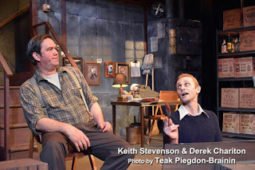 Sometimes the best theatre in Los Angeles comes from the smallest theatres. Pacific Resident Theatre is one of the most consistently excellent theatre production houses in town. Their season opener, “Andy Warhol’s Tomato,” proves the point. The story springs from a legend about the inspiration for the artist’s famous Pop Art Coke bottles, Brillo Boxes and Campbell Soup Can paintings and prints.
Sometimes the best theatre in Los Angeles comes from the smallest theatres. Pacific Resident Theatre is one of the most consistently excellent theatre production houses in town. Their season opener, “Andy Warhol’s Tomato,” proves the point. The story springs from a legend about the inspiration for the artist’s famous Pop Art Coke bottles, Brillo Boxes and Campbell Soup Can paintings and prints.
The story goes that at a local bar near his hometown, Pittsburgh, PA, Andy would draw pictures on cocktail napkins in exchange for free cold Coca-Colas. It’s not true, but Vince Melocchi, the playwright, used to drink at the real bar and heard the story, which forms the basis for his terrific one-act, 80-minute play, featuring Keith Stevenson as bar owner “Bones” (Mario “Bones” Bonino), and Derek Chariton as Andy. They’re both superb and the direction by Dana Jackson couldn’t be better.
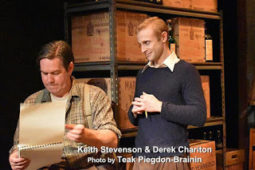 If you didn’t know this was fiction, you’d think you were watching Andy’s origin story. We meet Andy at 18, frail, pale and full of anxiety, who has passed out on the street in front of Bones’s bar, Bonino’s. Bones brings Andy to the basement of the bar to recover, and when he wakes up, they begin to talk.
If you didn’t know this was fiction, you’d think you were watching Andy’s origin story. We meet Andy at 18, frail, pale and full of anxiety, who has passed out on the street in front of Bones’s bar, Bonino’s. Bones brings Andy to the basement of the bar to recover, and when he wakes up, they begin to talk.
Bones is a blue collar guy and Andy is gay, or as Bones initially frames it, “funny.” (This is set in the 1940s, when being gay wasn’t acceptable to society.) Though Warhol’s parents were poor immigrants, he never had any doubt that he would be famous and would live the high life. Bones’s ambitions aren’t that grand.
Andy is about to be kicked out of school if he doesn’t finish the required sketchbook for his remedial drawing class at Carnegie Tech. As weak and sickly as he seems, he’s strongly determined that his aesthetic ideas and talent will carry him far. Bones, meanwhile, spends late nights at the typewriter, writing marketing phrases that he hopes will win him a prize, like the one he creates for Rolling Rock beer.
As Andy begins to explore the basement, he accidentally knocks a picture off the wall, breaking the frame that held it; a frame significant to Bones because it’s irreplaceable. It was made by his father, who’s dead now. Andy’s father died when he was young. Apologetic but confident he’s offering something of equal value, Andy offers to paint a sign that Bones has been wanting to put up above the door of his bar.
 Bones knows what he wants that sign to say and look like, but Andy knows he has a better idea and proceeds to execute his vision. We see the beginnings of the designing mind that will lead him to a career in commercial advertising, before he gains fame in New York as a fine artist.
Bones knows what he wants that sign to say and look like, but Andy knows he has a better idea and proceeds to execute his vision. We see the beginnings of the designing mind that will lead him to a career in commercial advertising, before he gains fame in New York as a fine artist.
Bones manages to sneak a peek at Andy’s sketchbook and Andy is upset. “Great art takes time,” he says. Not much later, when Bones is out of the room, Andy finds Bones’s covered typewriter with pages sitting on top, and takes a few of those pages to read. When Bones later finds out, it infuriates him; more because he doesn’t think he has any talent. Andy disagrees and continues to encourage Bones, in the same way that Bones stays on top of Andy to finish both the sign and his sketchbook.
As a relationship develops between them, Bones offers Andy some very practical advice when he finds himself uninspired; “keep it simple,” and “there’s beauty in the mundane,” Andy in turn tries to persuade Bones that he, too, is an artist. He loves what he’s read of Bones’s work.
Ultimately the bar sign ends up increasing business for Bones, and Andy gains the inspiration he needs from Bones and his coke bottles; before the play ends we understand why it’s called “Andy Warhol’s Tomato.”
Although there is much that is different about who they are as people in the beginning, a real affection, much like a father-son relationship develops between them. And in the end, this is a play about two people who really aren’t so different after all.
 The dialogue is genuine, the acting feels completely natural and the play succeeds on every level. I highly recommend you see this small gem before it’s scheduled to end on September 22.
The dialogue is genuine, the acting feels completely natural and the play succeeds on every level. I highly recommend you see this small gem before it’s scheduled to end on September 22.
Pacific Resident Theatre is located at 703 Venice Blvd., in Venice. Don’t miss this one. Call for tickets at 310-822-8392 or online https://pacificresidenttheatre.org/andy-warhols-tomato/
Sarah A. Spitz is an award-winning public radio producer, now retired from KCRW, where she also produced arts stories for NPR. She writes features and reviews for various print and online publications.
September 3, 2019 Laura Foti Cohen Leave a comment
Note: Andy Warhol’s Tomato has been extended through October 27, 2019.
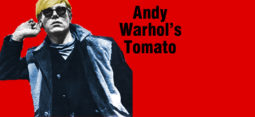 The thrill of live theater is its immediacy. At a play—whether life-affirming or just plain awful—actor and audience share a never-to-be-repeated experience. When an actor cries onstage, it’s by definition in a single take. When a cell phone rings, movie actors don’t have to resist the urge to yell at the inconsiderate audience member. Stage actors do. (So do other audience members.)
The thrill of live theater is its immediacy. At a play—whether life-affirming or just plain awful—actor and audience share a never-to-be-repeated experience. When an actor cries onstage, it’s by definition in a single take. When a cell phone rings, movie actors don’t have to resist the urge to yell at the inconsiderate audience member. Stage actors do. (So do other audience members.)
We go to the theater for unique experiences and on rare occasions we’re rewarded with something transcendent. Something like Andy Warhol’s Tomato.
Pacific Resident Theatre opens its 35th season with this moving world premiere, by company member and Pittsburgh native Vince Melocchi. The playwright astutely presents the city where he grew up and two very different life paths: blue-collar rut and ambitious breakout. Workshopped and honed over the course of two years, the show is a tribute to the talent of the PRT company, and the commitment of the producer team of Sara Newman-Martins and PRT Artistic Director Marilyn Fox to spotlight high-quality new works.
 Andy Warhol (Derek Chariton) works on a sign for a bar owned by “Bones” Bonino (Keith Stevenson)
Andy Warhol (Derek Chariton) works on a sign for a bar owned by “Bones” Bonino (Keith Stevenson)
In a Pittsburgh bar circa 1946, owner “Bones” Bonino (Keith Stevenson) works the adding machine amidst cases of liquor and beer. Andy Warhola (Derek Chariton) is passed out in a corner; he’s had a panic attack. Bones is doing a favor for Andy’s brother, a fruit and vegetable vendor, by keeping an eye on him until he comes to.
Once he does, the two men begin to talk and find little in common. Delicate Andy is almost done in by the pressure to fill a sketchbook with drawings that will prevent him from being kicked out of Carnegie Tech. Bones, a no-nonsense working man, is initially unsympathetic. It’s only when the two discuss creating a sign for the bar that they start to dance around the subject of art and find a way toward something resembling mutual respect.
 As 18-year-old Andy, Chariton is remarkable. The pale and fragile teenager with the haunted mien displays flashes of confidence and humor that hint at the famed provocateur to come. Chariton subtly shapes his character, building from a likely loser with a far-fetched dream of success in New York to an artist inseparable from his art. Witty details and deft direction by Dana Jackson foreshadow and recast biographical tropes. Scenic designer Rich Rose does a masterful job of setting the stage to period perfection and includes a few witty details of his own.
As 18-year-old Andy, Chariton is remarkable. The pale and fragile teenager with the haunted mien displays flashes of confidence and humor that hint at the famed provocateur to come. Chariton subtly shapes his character, building from a likely loser with a far-fetched dream of success in New York to an artist inseparable from his art. Witty details and deft direction by Dana Jackson foreshadow and recast biographical tropes. Scenic designer Rich Rose does a masterful job of setting the stage to period perfection and includes a few witty details of his own.
Bones advises the aspiring artist to get a job in a restaurant when he gets to the big city so he doesn’t go hungry. In his world, risks don’t pay off; only a clear head and a good back-up plan guarantee survival. An eighth-grade dropout with a business to run, Bones nevertheless turns out to have a dream of his own. Stevenson slowly reveals the vulnerabilities behind the gruff exterior, creating a nuanced and multi-faceted man any of us would be fortunate to have on our side.
 Andy Warhol’s Tomato tells us—and shows us—that art is a living thing, always open to new interpretations. It asks big questions: Who decides what is art? What makes a man? How can we find common ground when the divide feels so wide? More importantly, it offers beautiful answers to those questions.
Andy Warhol’s Tomato tells us—and shows us—that art is a living thing, always open to new interpretations. It asks big questions: Who decides what is art? What makes a man? How can we find common ground when the divide feels so wide? More importantly, it offers beautiful answers to those questions.
This is art.
Andy Warhol’s Tomato plays Thursdays through Saturdays at 8:00 pm, matinees Sundays at 3:00 pm. Its run has been extended through Oct. 27. Pacific Resident Theatre is located at 703 Venice Blvd. in Venice. Tickets are $25-34 and can be purchased here. It’s the first play in a season that includes Arthur Miller’s All My Sons, opening September 14.
ANDY WARHOL’S TOMATO by Carol Kaufman Segal
 Andy Warhol was born Andrew Warhola on August 6, 1928, in Pittsburgh, PA. (He later dropped the a from his last name.) The play, Andy Warhol’s Tomato by Vince Melocchi is making its World Premiere at the Pacific Resident Theatre in Venice.
Andy Warhol was born Andrew Warhola on August 6, 1928, in Pittsburgh, PA. (He later dropped the a from his last name.) The play, Andy Warhol’s Tomato by Vince Melocchi is making its World Premiere at the Pacific Resident Theatre in Venice.
The play takes place in the storage room of Bonino’s Bar in Homestead, a city near Pittsburgh, PA in the summer of 1946. Therefore, we know that Andy Warhol (Derek Chariton) is 18 years old when we see him awakening on the floor after having collapsed outside of the bar where he was rescued by Mario “Bones” Bonino (Keith Stevenson). Andy accidentally destroys a favorite picture frame of Bonino’s, and in order to make up for the loss, he offers to paint a new outdoor sign for his bar. This means he will be returning to the storage room until he finishes the painting.
 Playwright Melocchi develops the two very opposite characters, as they meet on a daily basis, in a way that makes one feel that the storyline is true, one a sensitive artist, the other seemingly a complete opposite rough bar owner. Watching Chariton’s portrayal of Warhol at that age seems so realistic, that I imagined him exactly as he is characterized on the stage by this marvelous actor.
Playwright Melocchi develops the two very opposite characters, as they meet on a daily basis, in a way that makes one feel that the storyline is true, one a sensitive artist, the other seemingly a complete opposite rough bar owner. Watching Chariton’s portrayal of Warhol at that age seems so realistic, that I imagined him exactly as he is characterized on the stage by this marvelous actor.
I could not have expected the sensitive character that Bones so remarkably turns into in his day to day encounter with Andy. But after all, as we discover, he is not as crass as he appears. He has secretly been hiding his typewriter and the writing that he has been spending his time developing for some time. Not even his wife is aware of his extracurricular activity. Stevenson is outstanding as he portrays this rough but sensitive man.
 According to Vince Melocchi, the connection that he developed between Andy Warhol and Mario Bonino is due to his perfect knowledge of these two men. He admits that it is “because in many ways I am both of them, I’m the artist and will always identify with the blue collar man”. Wonderfully written, superbly performed, well-directed by Dana Jackson, perfect scenic design by Rich Rose, all makes for a production you won’t want to miss.
According to Vince Melocchi, the connection that he developed between Andy Warhol and Mario Bonino is due to his perfect knowledge of these two men. He admits that it is “because in many ways I am both of them, I’m the artist and will always identify with the blue collar man”. Wonderfully written, superbly performed, well-directed by Dana Jackson, perfect scenic design by Rich Rose, all makes for a production you won’t want to miss.
 Andy Warhol’s Tomato plays Thursdays through Saturdays at 8 PM, Sundays at 3 PM, through September 22, at the Pacific Resident Theatre, 703 Venice Blvd., Venice. Tickets and/or information are available online at pacificresidentheatre.com, or by phone at (310) 822-8392.
Andy Warhol’s Tomato plays Thursdays through Saturdays at 8 PM, Sundays at 3 PM, through September 22, at the Pacific Resident Theatre, 703 Venice Blvd., Venice. Tickets and/or information are available online at pacificresidentheatre.com, or by phone at (310) 822-8392.
‘Andy Warhol’s Tomato’ offers a surprising olive branch in the culture wars
A blue-collar bar owner (Keith Stevenson) has reservations about the unconventional signage proposed by a young Andy Warhol (Derek Chariton) in “Andy Warhol’s Tomato” at Pacific Resident Theatre. (Teak Piegdon-Brainin)
By PHILIP BRANDES
AUG. 16, 2019
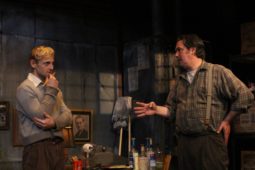 Staunchly working-class Pittsburgh in 1946 was hardly an ideal incubator for creative talent. That incongruity, however, provides an inspired backdrop for the chance encounter between a disillusioned, middle-aged bar owner and a frail, 18-year-old art student destined for greatness in “Andy Warhol’s Tomato,” Vince Melocchi’s quietly touching two-hander making its debut at Pacific Resident Theatre.
Staunchly working-class Pittsburgh in 1946 was hardly an ideal incubator for creative talent. That incongruity, however, provides an inspired backdrop for the chance encounter between a disillusioned, middle-aged bar owner and a frail, 18-year-old art student destined for greatness in “Andy Warhol’s Tomato,” Vince Melocchi’s quietly touching two-hander making its debut at Pacific Resident Theatre.
The drab, close-cropped Andy depicted here by Derek Chariton is a long way from the flamboyant, leather-clad celebrity of the 1960s New York art scene. At this point, young Andy’s ambition to become a commercial artist is hanging by a thread due to failing grades in his first year of college.
With a deadline looming in his last-chance remedial drawing class, a panic attack has left Andy recovering in the basement of a neighborhood bar run by kind-hearted “Bones” Bonino (Keith Stevenson), a self-made businessman who proves surprisingly open-minded despite his gruff no-nonsense demeanor.
Warhol, himself the child of hard-working Eastern European immigrants, shares Bones’ “pull yourself up by your own bootstraps” ethos, but little else. Chariton’s richly-shaded performance is an intriguing mix of Andy’s awkward self-consciousness and unshakable confidence in his own artistic gifts, the detailed career path he’s mapped out for himself.
Andy’s fully-formed marketing savvy comes to the fore when he agrees to paint a street sign for Bones’ bar. Whether he regards Bones as a friend and benefactor or just an interesting specimen is kept deliberately ambiguous for much of the play — beneath the halting “Uhs” that punctuate his diffident banter lurks Warhol’s notorious talent for passive-aggressive manipulation.
Playwright Melocchi has clearly done his homework with respect to historical accuracy. Nevertheless, the play offers more than a biographical sketch thanks to the reciprocal fleeting connection between Chariton’s Warhol and Stevenson’s equally complex performance as Bones, a sympathetic Everyman who harbors an unfulfilled dream of becoming a writer.
Tracing assured emotional beats under Dana Jackson’s finely-tuned direction, Bones’ secret longing is rekindled by Andy’s fearless talent and encouragement. In return, the pragmatic Bones helps Andy overcome his own creative block by urging him to appreciate beauty in the mundane — a simple tomato is a miracle if you look at it the right way. Or package it in a soup can.
Amid the ongoing culture wars between urban-elite and blue-collar sensibilities, Melocchi’s period play slyly reminds us the division can be bridged by our fundamental human need to create. In the process we can become something more than what our circumstances have shaped us to be.
CRITICS CHOICE
‘Andy Warhol’s Tomato’
Where: Pacific Resident Theatre, 703 Venice Blvd., Venice
When: 8 p.m. Thursdays-Saturdays, 3 p.m. Sundays, through Sept. 22
Tickets: $25-$34
Info: (310) 822-8392 or pacificresidenttheatre.com
Running time: 1 hour, 20 minutes
 Review:
Review:
Andy Warhol’s Tomato is a portrait of the artist as a young man. Warhol, who came to fame in the 1960s, is the subject of Vince Melocchi’s new play, a two-hander set in Pittsburgh, the playwright’s home town. It was there, Melocchi reports in a program note, that he was told that the teenaged Warhol had drawn pictures on napkins in a local bar in exchange for Coca-Colas. Although that bit of urban folklore turned out to be untrue, it inspired Melocchi to write the piece.
The playwright sets his 80-minute, world-premiere drama in the basement of Bonino’s bar, a neighborhood joint frequented by steel-workers. Mario “Bones” Bonino (Keith Stevenson), is a blue-collar guy himself, a hulking, tough-minded Italian-American with a secret life that leaks out when he inter-acts with the youthful Andy Warhol (Derek Chariton).
The time is the summer of 1946 and the sickly, fey but gifted Warhol has passed out in front of Bones’s bar (in real life Warhol suffered from a rare neurological disorder). The gruff but compassionate Bones has carried Warhol down to his basement to recover. What follows is an intriguing, compelling character study, one that catches you up in its truth and sensitivity as the two apparent opposites begin to develop a kinship.
Warhol’s prime possession is his sketchbook. Filled with his drawings, he hopes it will be his ticket to gaining admission to Carnegie Tech University. Bones at first is cynical about Warhol’s talent. He calls the kid Picasso and doubts whether he will ever be able to make his mark on the art world. But he is forced to change that assessment when he gets to see Warhol in action, painting a sign for his bar. What could easily have been a cliché, banal object becomes in Warhol’s hands a thing of striking beauty and originality.
As for Warhol, he too begins to appreciate and respect Bones, especially when he discovers that this seemingly crude, macho guy has an artistic side. All his life Bones has not only loved literature but yearned to write it. But because in his circles just admitting that you know how to type marks you as a fag, Bones has had to write in secret, down here in his basement, not telling anyone what he was doing. Full of doubts about his worth as a writer, he is buoyed by Warhol’s positive response to his work.
The two-would-be, struggling artists begin to bond in an us-against-the-world way, a development that is almost destroyed when the homosexual Warhol can’t hold back and makes a pass at Bones. How the latter handles this erotic move takes their relationship to a new and deeper level.
The skill of Melocchi’s writing is matched by the remarkable acting work by Stevenson and Chariton. Together they breathe life into every line of Melocchi’s text, creating flesh-and-blood characters that hold you in thrall from start to finish.
Cast:
Keith Stevenson, Derek Chariton
Technical:
Lighting/Projections: Andrew Schmedake. Set: Rich Rose. Sound: Christopher Moscatiello. Costumes: Keilani Gleave.
Critic:
Willard Manus
Date Reviewed:
August 2019
Through September 22
RECOMMENDED
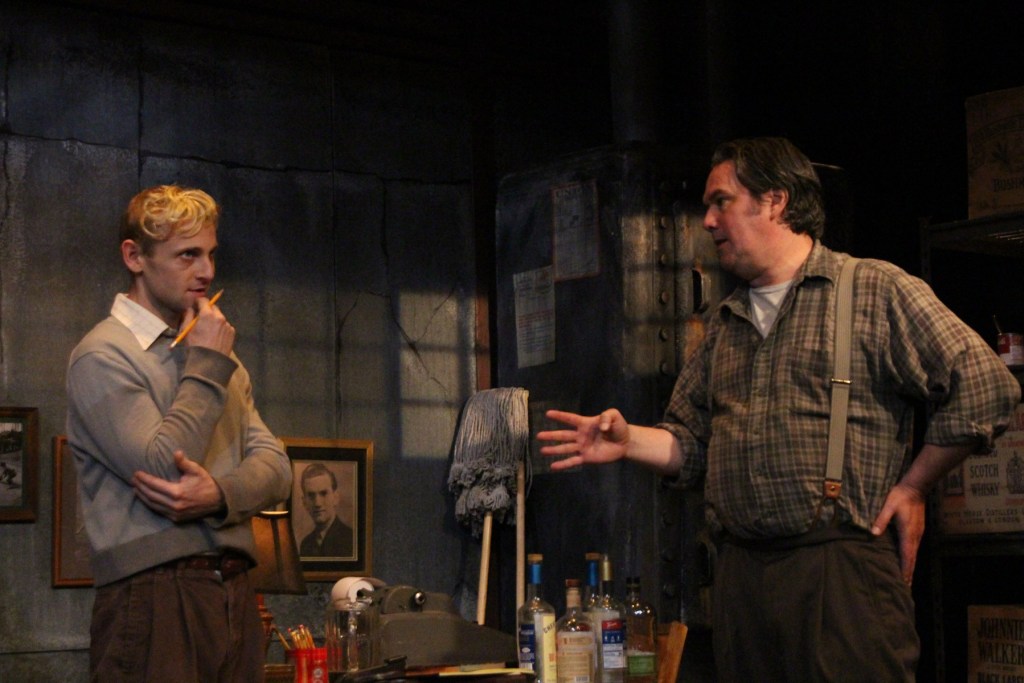 Back in the ’60s, Andy Warhol was quoted as saying, “In the future, everyone will be world-famous for 15 minutes” — but his own fame clearly outpaced that prediction. He’s been the subject of films and books, and now playwright Vince Melocchi has crafted a play about the artist before he was celebrated, titled Andy Warhol’s Tomato. The world premiere production at Pacific Resident Theatre is a well-acted and entertaining addition to Warhol lore.
Back in the ’60s, Andy Warhol was quoted as saying, “In the future, everyone will be world-famous for 15 minutes” — but his own fame clearly outpaced that prediction. He’s been the subject of films and books, and now playwright Vince Melocchi has crafted a play about the artist before he was celebrated, titled Andy Warhol’s Tomato. The world premiere production at Pacific Resident Theatre is a well-acted and entertaining addition to Warhol lore.
In 1946 small town Pennsylvania, college-age Andrew Warhola (Derek Chariton) has passed out from an anxiety attack on a city street. He wakes up in the back room of Bonino’s bar, temporarily tended to by the establishment’s owner, Bones (Keith Stevenson), until Andy’s brother can pick him up. The artistically ambitious, somewhat affected and not very covertly gay Andy and the gruff but kind blue-collar Bones couldn’t seem more different. However, as they spend more time together (Andy paints the sign for the bar), they realize that they’re both aspiring artists, each in his own way.
Chariton does a nice job of portraying Andy before the Warhol persona was fully formed, with a combination of artistic enthusiasm and curiosity mixed with touchy defensiveness and pointed humor. It’s an engaging and skilled performance, and I was struck by how credibly one could imagine this character moving to New York and becoming the artist we all know. Stevenson is excellent as Bones, and although his character, as written, is less flamboyant than Andy, he’s the heart of the play. Decency and the demanding struggle to be a good person don’t always sound charismatic, but Stevenson’s performance is affecting and subtle and seems true-to-life. This grounds the show and transforms it from what could have been a celebrity anecdote into an interesting human drama.
Dana Jackson’s sure-handed direction draws terrific work from her cast, and a moment toward the end of the show where Warhol’s sketches are projected onto part of the set provides the production with a lovely note of visual grace. Rich Rose’s detailed set — the backroom of a bar packed with stacked boxes of beer and whiskey and a convincing steam boiler — greatly adds to the story’s authenticity. Melocchi’s writing is funny and sometimes touching, and the piece is an enjoyable look at a lesser-known period of Warhol’s life. My only quibble is that sometimes it is a bit too “on the nose,” with specific explanations for various preeminent aspects of the artist’s work.
Overall, however, Andy Warhol’s Tomato is a strong and entertaining production about a unique artist. As Bones says in the play, “There is beauty in the mundane.” This show has found it.
Pacific Resident Theatre, 703 Venice Blvd., Venice; Thurs.-Sat., 8 p.m.; Sun., 3 p.m.; through Sep. 22. www.pacificresidenttheatre.com. Running time: approximately one hour and 20 minutes with no intermission.
Andy Warhol’s Tomato Review – A Creative Conundrum
August 11, 2019 Elaine Mura Entertainment
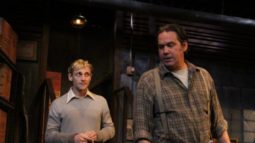 Derek Chariton and Keith Stevenson in ANDY WARHOL’S TOMATO – Photo by Teak Piegdon-Brainin Pittsburgh, Pennsylvania folklore tells about a bar where teenager Andy Warhol drew pictures on napkins in exchange for bottles of Coke: “It was a nice story, but just a story.” Inspired by this apocryphal tale, talented playwright Vince Melocchi fleshes out this bare bones fiction with infinite delicacy and gentle grace. Both Pittsburgh natives, Melocchi and Warhol would appear to share more than their roots as Melocchi plumbs the account of well-hidden talents which may never see the light of day. An official selection of the Road Theatre Company’s 1918 Summer Playwrights Festival, ANDY WARHOL’S TOMATO receives its world premiere staging and ushers in the Pacific Resident Theatre’s 1919-1920 season.
Derek Chariton and Keith Stevenson in ANDY WARHOL’S TOMATO – Photo by Teak Piegdon-Brainin Pittsburgh, Pennsylvania folklore tells about a bar where teenager Andy Warhol drew pictures on napkins in exchange for bottles of Coke: “It was a nice story, but just a story.” Inspired by this apocryphal tale, talented playwright Vince Melocchi fleshes out this bare bones fiction with infinite delicacy and gentle grace. Both Pittsburgh natives, Melocchi and Warhol would appear to share more than their roots as Melocchi plumbs the account of well-hidden talents which may never see the light of day. An official selection of the Road Theatre Company’s 1918 Summer Playwrights Festival, ANDY WARHOL’S TOMATO receives its world premiere staging and ushers in the Pacific Resident Theatre’s 1919-1920 season.
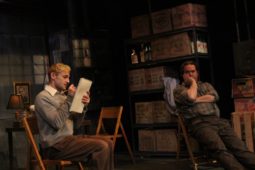 Derek Chariton and Keith Stevenson – Photo by Teak Piegdon-Brainin
Derek Chariton and Keith Stevenson – Photo by Teak Piegdon-Brainin
Set in Homestead, a city near Pittsburgh, in the summer of 1946, naive teenager Andy Warhol (Derek Chariton) is just beginning to flap his juvenile wings when he meets Mario “Bones” Bonino (Keith Stevenson), the owner of a shabby, working-class bar. Following a mishap in the bar’s basement which results in Bonino’s favorite picture frame ending a smashed mess, Andy agrees to pay Bonino back by painting a new sign for the bar. It quickly becomes evident that both men have quite a different view of what the finished product will look like.
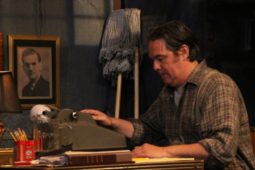 Keith Stevenson – Photo by Teak Piegdon-Brainin
Keith Stevenson – Photo by Teak Piegdon-Brainin
Soon Andy has found his new safety haven – and his new but reluctant friend – within the confines of a dark cellar. And soon, despite his own upbringing, “Bonesy” takes on the role of savior and mentor for the peculiar lad. After all, Bonesy has his own secrets: he slavishly hides his writing – and even his typewriter – from his own wife and everyone in his hard-working, heavy-drinking circle. From an uneasy truce, can Andy and Bones come to an understanding about creativity and life in general? This is a play which exquisitely traces the steps.
 Derek Chariston and Keith Stevenson – Photo by Teak Piegdon-Brainin
Derek Chariston and Keith Stevenson – Photo by Teak Piegdon-Brainin
With a well-written script and two very capable actors breathing life into quirky Andy and stolid Bonesy, ANDY WARHOL’S TOMATO has taken a cute and certainly untrue story from Andy Warhol’s early life and turned it into a play with a profound and timeless message for all. Kudos for director Dana Jackson’s tender handling of dynamics which, in lesser hands, might falter. Light and projection designer Andrew Schmedake has done a brilliant job of turning the dull and dim basement into a place of light and life. Rich Rose’s scenic design has just the right grimy feel, and the entire production staff functions with creative competence. ANDY WARHOL’S TOMATO is a not-to-be-missed study of what goes into achieving the goals of self-understanding and acceptance. And, besides, it’s an entertaining and often humorous evening out.
SPLASH SELECTION
ANDY WARHOL’S TOMATO runs through September 22, 2019 with performances at 8 p.m. on Thursdays through Saturdays and at 3 p.m. on Sundays. The Pacific Resident Theatre is located at 703 Venice Blvd., Venice, CA 90291. Tickets are $25 (Thursdays and Fridays), $34 (Saturdays), and $30 (Sundays). For information and reservations, call 310-822-8392 or go online.
 A father (Richard Fancy) pleads pleads with his son in Arthur Miller’s All My Sons.
A father (Richard Fancy) pleads pleads with his son in Arthur Miller’s All My Sons. The plot is deceptively simple: Joe and Kate Keller have two sons, Chris and Larry, both of whom served in World War II. Chris came home, Larry is MIA. Chris has invited Larry’s girlfriend, Ann, who had moved away after his disappearance, to come for a visit.
The plot is deceptively simple: Joe and Kate Keller have two sons, Chris and Larry, both of whom served in World War II. Chris came home, Larry is MIA. Chris has invited Larry’s girlfriend, Ann, who had moved away after his disappearance, to come for a visit.
 The world premiere of playwright Vince Melocchi’s Andy Warhol’S TOMATO receives a solid mounting at the Pacific Resident Theatre. Dana Jackson directs this fictionalized two-hander on the possible beginnings of pop artist icon Andy Warhol, with a deft hand and a meticulous eye for character development via the subtle physical actions of the two wonderfully convincing actors – Derek Chariton as Andy Warhol and Keith Stevenson as Bones BWW Review: An Intriguing ANDY WARHOL’S TOMATO Captivates at the Pacific Resident Theatre. Bonino, the owner of the bar’s storage room which TOMATO entirely takes place in. Chariton vividly captures the unique idiosyncrasies of Warhol while giving inner life to lines Warhol might have really said. Stevenson effortlessly portrays Bones, some might describe as the polar opposite of Warhol, as a gruff on the outside, compassionate, caring drinking man’s man. Their initial cat-and-mouse dialogue so piques your interest questioning what exactly keeps their conversation going.
The world premiere of playwright Vince Melocchi’s Andy Warhol’S TOMATO receives a solid mounting at the Pacific Resident Theatre. Dana Jackson directs this fictionalized two-hander on the possible beginnings of pop artist icon Andy Warhol, with a deft hand and a meticulous eye for character development via the subtle physical actions of the two wonderfully convincing actors – Derek Chariton as Andy Warhol and Keith Stevenson as Bones BWW Review: An Intriguing ANDY WARHOL’S TOMATO Captivates at the Pacific Resident Theatre. Bonino, the owner of the bar’s storage room which TOMATO entirely takes place in. Chariton vividly captures the unique idiosyncrasies of Warhol while giving inner life to lines Warhol might have really said. Stevenson effortlessly portrays Bones, some might describe as the polar opposite of Warhol, as a gruff on the outside, compassionate, caring drinking man’s man. Their initial cat-and-mouse dialogue so piques your interest questioning what exactly keeps their conversation going. ious Andy waking up after being rescued prone off the street in front of Bonino’s by Bones. TOMATO presents an intimate, quiet look at the various encounters Andy and Bones have after Andy agrees to compensate for a picture frame of Bones he damaged, with the painting of Bonino’s new front door sign. Melocchi sprinkles enough known facts of Warhol’s life to make you wonder, really wonder, if you’re watching a non-fiction depiction rather than the well-constructed story Melocchi made up.
ious Andy waking up after being rescued prone off the street in front of Bonino’s by Bones. TOMATO presents an intimate, quiet look at the various encounters Andy and Bones have after Andy agrees to compensate for a picture frame of Bones he damaged, with the painting of Bonino’s new front door sign. Melocchi sprinkles enough known facts of Warhol’s life to make you wonder, really wonder, if you’re watching a non-fiction depiction rather than the well-constructed story Melocchi made up. “CRITIC’S CHOICE” – LA Times “TOP TEN” – Stage Raw
“CRITIC’S CHOICE” – LA Times “TOP TEN” – Stage Raw Sometimes the best theatre in Los Angeles comes from the smallest theatres. Pacific Resident Theatre is one of the most consistently excellent theatre production houses in town. Their season opener, “Andy Warhol’s Tomato,” proves the point. The story springs from a legend about the inspiration for the artist’s famous Pop Art Coke bottles, Brillo Boxes and Campbell Soup Can paintings and prints.
Sometimes the best theatre in Los Angeles comes from the smallest theatres. Pacific Resident Theatre is one of the most consistently excellent theatre production houses in town. Their season opener, “Andy Warhol’s Tomato,” proves the point. The story springs from a legend about the inspiration for the artist’s famous Pop Art Coke bottles, Brillo Boxes and Campbell Soup Can paintings and prints. If you didn’t know this was fiction, you’d think you were watching Andy’s origin story. We meet Andy at 18, frail, pale and full of anxiety, who has passed out on the street in front of Bones’s bar, Bonino’s. Bones brings Andy to the basement of the bar to recover, and when he wakes up, they begin to talk.
If you didn’t know this was fiction, you’d think you were watching Andy’s origin story. We meet Andy at 18, frail, pale and full of anxiety, who has passed out on the street in front of Bones’s bar, Bonino’s. Bones brings Andy to the basement of the bar to recover, and when he wakes up, they begin to talk. The dialogue is genuine, the acting feels completely natural and the play succeeds on every level. I highly recommend you see this small gem before it’s scheduled to end on September 22.
The dialogue is genuine, the acting feels completely natural and the play succeeds on every level. I highly recommend you see this small gem before it’s scheduled to end on September 22. The thrill of live theater is its immediacy. At a play—whether life-affirming or just plain awful—actor and audience share a never-to-be-repeated experience. When an actor cries onstage, it’s by definition in a single take. When a cell phone rings, movie actors don’t have to resist the urge to yell at the inconsiderate audience member. Stage actors do. (So do other audience members.)
The thrill of live theater is its immediacy. At a play—whether life-affirming or just plain awful—actor and audience share a never-to-be-repeated experience. When an actor cries onstage, it’s by definition in a single take. When a cell phone rings, movie actors don’t have to resist the urge to yell at the inconsiderate audience member. Stage actors do. (So do other audience members.)



